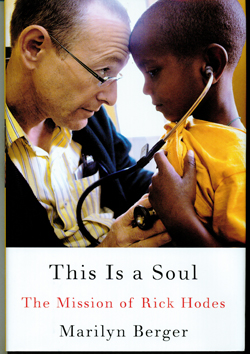This Is a Soul: The Mission of Rick Hodes by Marilyn Berger, HarperCollins, 2010; ISBN 978-0-06-175954-3, $25.99.
By Donald H. Harrison

SAN DIEGO—Journalist Marilyn Berger travels in circles which one would expect might lead to cynicism, or at least to the blasé attitude characterized by the phrase: “Been there, done that.” Based in New York City, she’s a former reporter with the Washington Post; her late husband Don Hewett was a producer of the television show Sixty Minutes; and she socializes with celebrities whom most of us have seen only on television. I’m talking about folks like Henry Kissinger and Alan Alda.
 How genuinely excited Berger becomes when confronted with goodness—as characterized by Dr. Rick Hodes, who operates a one-man medical clinic for the poorest of the poor in Addis Ababa — gives the reader the refreshing sense that anything is possible, that no matter how inured we are on the outside to the world and its injustices; in our insides beat idealistic, even romantic, hearts.
How genuinely excited Berger becomes when confronted with goodness—as characterized by Dr. Rick Hodes, who operates a one-man medical clinic for the poorest of the poor in Addis Ababa — gives the reader the refreshing sense that anything is possible, that no matter how inured we are on the outside to the world and its injustices; in our insides beat idealistic, even romantic, hearts.
Berger will tell her story and that of Hodes at 2 p.m., Thursday, Nov. 4, at the San Diego Jewish Book Fair at the Lawrence Family JCC. A lot of that tale will center on a youngster named Danny, who suffered tuberculosis of the lungs and spine as well as malnutrition before Berger discovered him on the streets of Addis Ababa, and subsequently arranged for him to visit Hodes’ clinic. After being cared for by Hodes, Danny later became a ward of Berger’s family, and, in her proud grandmotherly-like estimate, a boy genius.
But if Danny was the one who brought Berger to Hodes, it was the doctor’s own passionate, albeit chaotic outreach to the most destitute of Ethiopia’s children – mixed with his Orthodox Jewish beliefs – that kept Berger coming back to him, adding a vignette here, and a feature story there, to the reputation that has resulted in some referring to Hodes as the “Father Theresa” of Addis Ababa.
The comparison between Hodes and Mother Theresa is not that far-fetched. Hodes works closely with a mission that was started in the Ethiopian capital by the famed nun; he had met her, and to this day often works hand-in-glove with the sisters of her order to provide medical attention to the deformed and the diseased who might otherwise soon die.
Berger takes us into the home that Hodes shares with his adopted and foster children, all of them patients or former patients. The bachelor doctor not only provides them medical help, or arranges for them to have surgeries in far-off places, but he also pays for their schooling and sometimes help to support their families. Hodes works continuously—somehow keeping in his head the details of hundreds, if not thousands, of youngsters he helps to treat. His filing system—well, forget about it – his papers, x-rays, books are stacked together in his little house.
One could spend a lifetime just in Addis Ababa, but Hodes also goes on missions elsewhere in Africa to provide medical help in refugee camps and disaster areas. Whenever natural disasters strike Africa—which is too often – he is the first person who comes to the mind of his employers at the American Jewish Joint Distribution Committee. Hodes is a man who can be counted on to make friends with youngsters, no matter what their language, race, religion or illness. He has humor, compassion, and a quality all too rare in our world, according to Berger, true altruism.